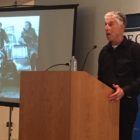
When Should You Stop Chasing Forgiveness — and Parole?
|
As I sat on my bunk — trying to understand why I was denied parole yet again — something in my mind was telling me that the parole board was never going to...
Juvenile Justice Information Exchange (https://jjie.org/page/68/)

In late September, Torri was driving down the highway with her 11-year-old son Junior in the back seat when her phone started ringing.
It was the Hamilton County Sheriff’s deputy who worked at Junior’s middle school in Chattanooga, Tennessee. Deputy Arthur Richardson asked Torri where she was. She told him she was on the way to a family birthday dinner at LongHorn Steakhouse.
“He said, ‘Is Junior with you?’” Torri recalled.
Earlier that day, Junior had been accused by other students of making a threat against the school. When Torri had come to pick him up, she’d spoken with Richardson and with administrators, who’d told her he was allowed to return to class the next day. The principal had said she would carry out an investigation then. ProPublica and WPLN are using a nickname for Junior and not including Torri’s last name at the family’s request, to prevent him from being identifiable.
When Richardson called her in the car, Torri immediately felt uneasy. He didn’t say much before hanging up, and she thought about turning around to go home. But she kept driving. When they walked into the restaurant, Torri watched as Junior happily greeted his family.
Soon her phone rang again. It was the deputy. He said he was outside in the strip mall’s parking lot and needed to talk to Junior. Torri called Junior’s stepdad, Kevin Boyer, for extra support, putting him on speaker as she went outside to talk to Richardson. She left Junior with the family, wanting to protect her son for as long as she could ...

As I sat on my bunk — trying to understand why I was denied parole yet again — something in my mind was telling me that the parole board was never going to...

Leaders across the United States agonize over recent mass shootings as Americans fear more to come. Perhaps we can learn from youth in two mega-cities...

Waiting to be taken to Dutchess County Jail for the last time, Matthew Herring knew from experience he needed something that would ease the pain to come. The 24-year-old from Fishkill, N.Y., anticipated an excruciating detox from heroin. So he grabbed a handful of Suboxone pills.

California is often viewed as having taken some of the most progressive steps toward reforming parole for people sentenced to life in prison as juveniles. But do those steps go far enough?

Nearly 25% of our population are teens and young adults in the most important developmental sprint of their lives. But rather than helping young people realize their great potential to become successful adults who contribute to our country’s future, too often we’re unwittingly cutting their progress off just before the finish line.

When photographer Richard Ross turns his lens on America, he sees a country that incarcerates 12-year-old children. He sees youth in prison — even though they themselves are victims of abuse and trauma. And he sees “juvie lifers” who spend decades behind bars for crimes they committed before their brains were fully developed.

March 7, 2012 my oldest brother was killed. He was killed by the NOPD (New Orleans Police Department). Coming home from school March 7, 2012, my oldest brother and his friend was sitting outside. They were just chilling and talking. Once he saw my siblings and I get off the school bus, he told us not to come outside until we finished our homework.

Six months ago, Philadelphia District Attorney Larry Krasner announced policies to reduce the number of children sent to juvenile placement. One focus was reforming probation, even though it is often thought of as an alternative to placement.